|
Bristol F.2B Fighter
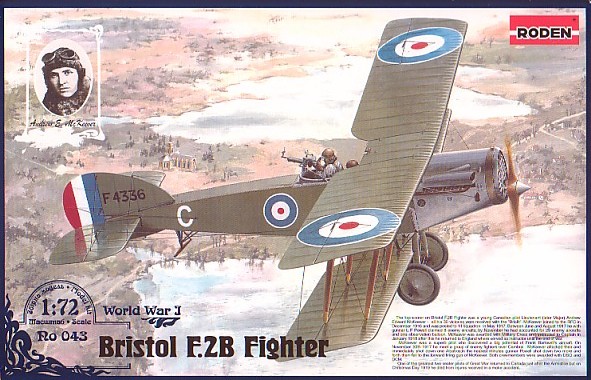
Roden 1/72
S
u m m a r y
|
| Catalogue Number: |
Kit No. 043 |
| Scale: |
1/72 |
| Contents and Media: |
103 parts in injection moulded
styrene; markings for seven aircraft |
| Price: |
USD$8.97 from Squadron.com
|
| Review Type: |
FirstLook |
| Advantages: |
Superbly detailed engine; logical
parts breakdown; exquisite detail |
| Disadvantages: |
No rigging diagram supplied. |
| Recommendation: |
Highly Recommended |
Reviewed by Robert Baumgartner

Roden's 1/72
scale Bristol F.2B Fighter is available online from Squadron.com
Roden has surprised us yet again with their latest release from the
first great conflict.
Not only are we blessed with a mainstream kit of this famous
two-seater, but we also find what is essentially a second kitted subject
inside.
Contents
The contents come sealed in two plastic bags, the plastic sprues in
one, decals and instructions in the other. Over one hundred parts are
supplied along with a decal sheet that gives markings for 7 aircraft.
Upon opening the instruction sheet, the builder is exposed to a most
welcome and unexpected surprise. There is a 20-piece Rolls Royce Falcon
engine complete with piping and mounts! Despite their size, the parts for
this are superbly moulded with very little flash. Fit is excellent
although the instructions will need to be consulted carefully at times to
find the precise angle and location of some parts. This engine will come
in very handy for the diorama builders or those that like panels removed
from their aircraft.
To view the engine, the front part of the fuselage must be cut away. The
area to be removed is clearly shown by a scribed line inside each fuselage
half. Careful cutting is required if the engine panels are to be used
again.
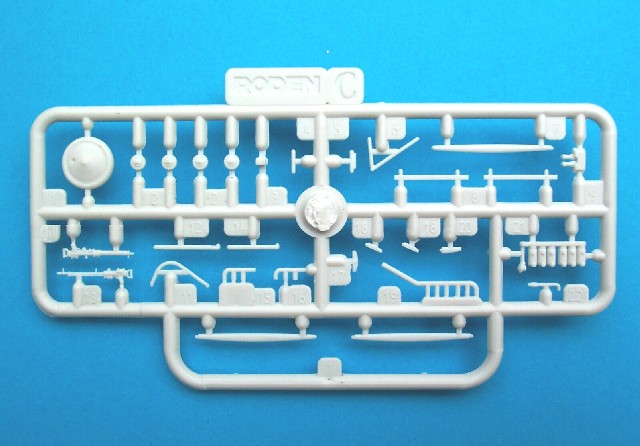
A lot of attention to detail has been shown with the fuselage parts.
Thankfully Roden have resisted the temptation to split up the fuselage
halves as seen on previous kits. The result is a kit that fits better and
can be assembled without removal of detail in the filling and sanding
process. These halves also show a nice representation of the lacing and
even display subtle fabric “wrinkles” in the corners. Now that’s
what I call attention to detail!
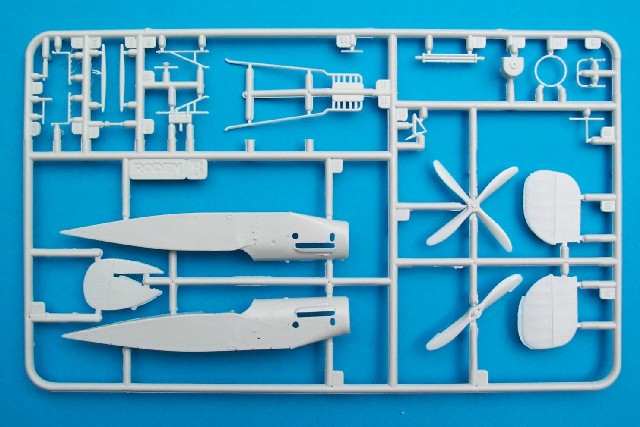
There are enough interior parts to make the cockpit look busy, something
helped by the moulded on structural framework. Assembly of this area is
straightforward with the instrument panel sides being the only items
needing trimming to ensure a secure fit.
There is an ejection pin inside each fuselage half which is mostly
hidden by the front seat. It can however, be totally removed if a little
care is shown with the scalpel.
The rear of the fuselage has a couple of shallow sink marks that are
easily filled with a smear of putty.
The wings are one-piece affairs, which is essential on a subject such as
the “Biff”. As expected, there is no warpage and the rib detail is nicely
restrained. All trailing edges are generally thin with a slight thickening
where flash has to be removed. A couple of wing tip blemishes would
benefit from a swipe with a sanding stick.
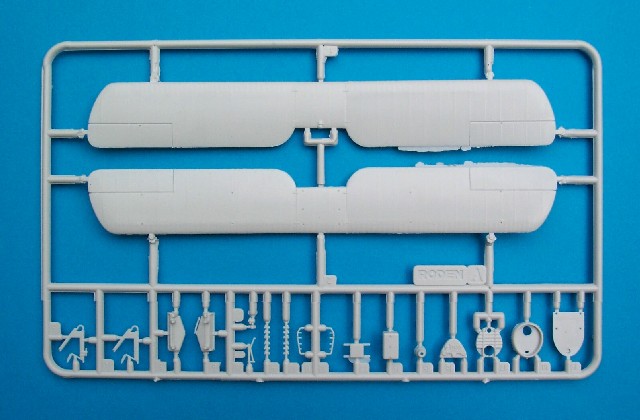
The usual headache of attaching the lower wing is eased by the clever
extension of the undercarriage to include the foremost fuselage attachment
struts. A trial fit of the parts showed no aspirins were needed during
this part of assembly.
Roden’s tradition of spare parts continues with extra Lewis guns and ammo
drums. Excellent! There are also both 2 and 4 bladed props, as well as
short and long exhausts to cater for the variety of options on the decal
sheet. A Vickers gun barrel is included for those that choose to remove
the engine panels.
A surprising omission is the rigging diagram so addition references are
needed. The nice box art won’t even come to the rescue here.
Comparison of the parts was made with Ian Stair’s drawings in the Albatros
Productions Datafile Special Vol 1 on the “Bristol Fighter” (these
replacing the different outlines drawn by Stair in the earlier Datafile
#4). Everything matched so well that it is obvious that they were the
source for the masters. Which is a good thing in this case.
Decal Options
Decals are provided for seven different aircraft and their selection is
both interesting and varied. The sheet was nearly in perfect register with
only the white outline of the fuselage roundels giving the game away. As
per previous releases, Roden have stuck to the matt finish. Experience
shows that the decals can sometimes have trouble conforming to surfaces,
even with the application of softening solutions so be careful here.
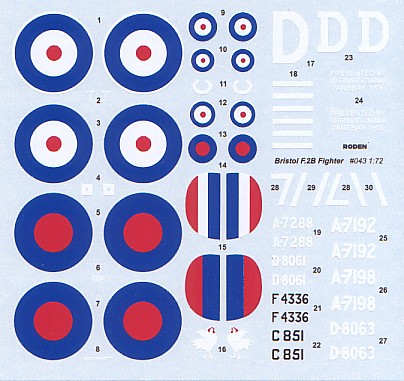
The instruction sheet lists the following options:
(I) Bristol F.2B D8061 of 48 Sqn. RAF, Western Front 1918
Crewed by 2/ Lt. FN Griffiths and Lt. AE Ansell. The presentation
inscription and serial number on this aircraft were merely “stick on”
pieces of fabric. This was done for photographic purposes in
appreciation of the donors. D8061 was finally shot down by Joseff Mai of
Jasta 5, killing its two occupants. In this case 2/Lts EJ McCutcheon and
VS Gray.
(II) Bristol F.2B A7288 of 11 Sqn. RFC, Western Front 1917
Crewed by Lt. Andrew Edward McKeever and Lt. L F Powell.
(III) Bristol F.2B C851 of 141 (HD) Sqn., 1918
Crewed by Lt. E E Turner and H B Barwise. They were credited with
shooting down Gotha G.V 979/16 of Bogohl on the night of 19/20 May.
(IV) Bristol F.2B D8063/D of 139 Sqn. RAF, Italian Front 1918
Crewed by Maj. W G Barker and HRH Prince Edward of Wales.
(V) Bristol F.2B A7198 of 1 Sqn. Australian Flying Corps, Palestine
1918
Crewed by Captain R Williams. The aircraft was later written off in a
crash.
(VI) Bristol F.2B A7192 of 1 Sqn. Australian Flying Corps, Palestine
1918
(VII) Bristol F.2B F4336 RAF, October 1917
Crewed by Lt. Andrew Edward McKeever.
This latest release from Roden has to be their best yet in this scale.
The "Brisfit" is not the easiest aircraft to manufacture in kit form, so
it is pleasing to see the very high standards attained here. ]
As for the engine… wow!
Highly recommended.
Thanks to
Squadron.com for the review
sample.
Review and Images Copyright © 2003 by
Robert Baumgartner
Page Created 01 May, 2003
Last updated 15 August, 2003
Back to HyperScale Main Page
Back to Reviews Page
|
Home | What's
New | Features
| Gallery |
Reviews | Reference
| Forum
| Search